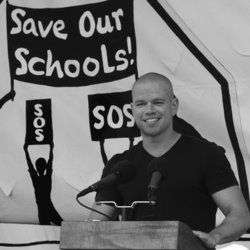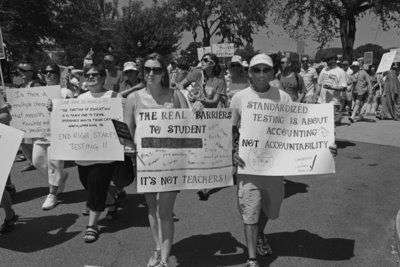SOS March Builds Pushback to Corporate Reform
Illustrator: Rick Reinhard

Pushing back against sustained attacks on teachers and public education, thousands of educators, parents, and activists came to Washington, D.C., July 28–31 to “Save Our Schools.” They responded to the SOS National Call to Action by attending a two-day conference, a spirited rally and march to the White House, and a post-rally congress to build on what they started.
The call to action focused on four core demands:
- Equitable funding for all public school communities
- An end to high-stakes testing for student, teacher, and school evaluation
- Curriculum developed for and by local school communities
- Teacher and community leadership in forming public education policies
The SOS mobilization reflected growing opposition to the corporate reform agenda of testing, teacher bashing, and privatization. It drew strength over the past year from several sources:

Save Our Schools rally and speakers (clockwise from left) Jonathan Kozol,
Deborah Meier, Angela Valenzuela and Pedro Noguera
- A corporate reform offensive, headlined by the pro-charter propaganda film Waiting for “Superman” and fueled by barrels of hedge fund money, spurred many to support the SOS call for a national mobilization to defend public education.
- The SOS effort made effective use of the web and social media. A core of knowledgeable education bloggers, led by veteran teachers Anthony Cody, Nancy Flanagan, and Ken (“teacherken”) Bernstein regularly refuted “reformy” propaganda. Multiple twitter accounts, Facebook pages, and SOS logos spread the word.
- When the corporate offensive turned into multi-state attacks on collective bargaining, public worker benefits, and teachers’ job rights, the stakes and pressure for political fightback rose. Rebellion in Wisconsin and resistance in Ohio, New Jersey, and elsewhere helped push the national teachers’ unions to endorse the SOS march, although the alliance was tenuous on both sides and the NEA and AFT did not turn out large numbers in July.
- A growing number of well-known, respected advocates for public education, led by Diane Ravitch, threw their support behind the effort, including Jonathan Kozol, Linda Darling-Hammond, Pedro Noguera, Angela Valenzuela, and Nancy Carlsson-Paige. Actor Matt Damon added media visibility and celebrity star power.
- The newly formed Parents Across America network signed on and broadened the project’s base and outreach.

Matt Damon
The march and rally drew up to 8,000 people in near 100-degree heat, according to press estimates. Much of the national media focused on Damon’s appearance; he proved to be well informed about the substance of education reform issues. In his well-received speech, Damon told the crowd:
This has been a horrible decade for teachers. I can’t imagine how demoralized you must feel. But I came here today to deliver an important message to you: As I get older, I appreciate more and more the teachers that I had growing up. And I’m not alone. There are millions of people just like me.
So the next time you’re feeling down, or exhausted, or unappreciated, or at the end of your rope; the next time you turn on the TV and see yourself called “overpaid”; the next time you encounter some simpleminded, punitive policy that’s been driven into your life by some corporate reformer who has literally never taught anyone anything . . . please know that there are millions of us behind you.
The pre-rally conference drew 400 participants, and could have drawn twice that number had space allowed. Rethinking Schools sponsored a workshop on education activism that drew 100 people. A session of union activists initiated by Milwaukee Teachers’ Education Association President and Rethinking Schools Editor Bob Peterson drew more than 40 people from across the country and made plans to work together over the coming months.

Teachers march in Washington, D.C. Matt Damon told teachers
“there are millions of us behind you.”
Although the conference, march, and rally were clear successes, the Sunday congress struggled with its charge to develop a plan to sustain the SOS project into the future. More than 100 activists participated in small group discussions about potential priorities and campaigns, and interest in building a national network was high. But the resource and organizational issues are substantial and the growth of the SOS project beyond initial expectations has stretched capacity to the limits. An interim steering committee was formed to develop a transitional plan. For more info, visit www.saveourschoolsmarch.org.

